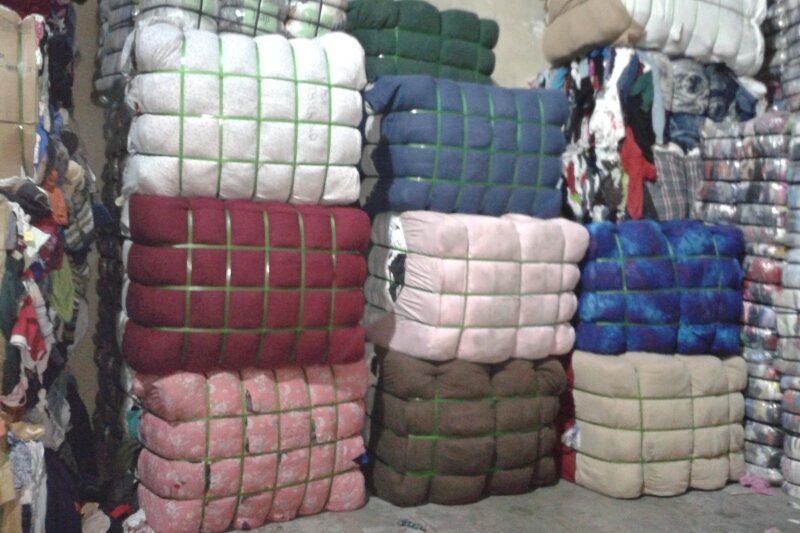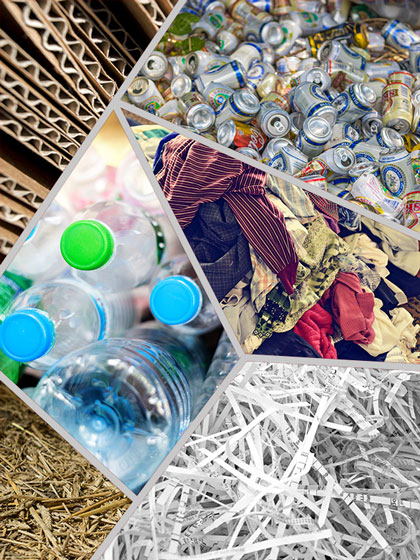
Every family has used clothes, and most people just give them to the peddlers who collect scrap. However, there is a different kind of recycling business, which seems small, but brings you lucrative revenue streams. Compared with the meager profit margins of collecting scrap, this business has a profit margin of 30% and can earn hundreds of thousands of CNY a year.
In China, there is a news with a very "sharp" word: recycling used clothes to earn 2 million yuan (about US$300,000) a year. It sounds unbelievable, but actually it could be feasible if you operate in correct ways. This depends on how many used clothes your cooperative partners can collect and deliver. More quantity means more profit. And need investing on right clothes recycling equipment like clothes balers. Here's what's going on in the recycling business.
What is Involved in Used Clothes Recycling Business?
The recycling of used clothes belongs to the resource-based recycling industry. The business mainly includes three sectors which are recycling, processing, and selling. The main profit point is the primary processing of used clothes and the reuse of raw materials. Sales channels include renewable resource companies, textile manufacturers, and exporters.
The Value of Products Made from Recycled Clothes
Used clothes can be processed into cloth, floor mop, greenhouse insulation felt and other primary products. Through regeneration, the used clothing can be produced into cotton, non-woven fabric, chemical fiber, etc. And you will find there is almost no difference in quality with new products made from virgin raw material.
Furthermore, these recycled new products have wide usage. Take non-woven fabrics as an example, after the government announced the "plastic ban", the domestic demand for non-woven fabrics is multiplying which boost sales. In international markets, the sales of non-woven fabrics are also increasing. According to researches on Future Market Insights, the global non-woven fabrics market is valued at US$ 41,892.2 million in 2022 and is anticipated to increase to US$ 82,345.9 million in 2032. The compounded annual growth rate for the non-woven fabrics market is expected to be 7% owing to its extensive usages and material characteristics.
Each ton of recycled used clothes can be produced into 0.99 tons of non-woven fabrics or 0.99 tons of colored cotton yarn, which saves 1.1 tons of textile raw materials or 0.8 tons of raw cotton. Every year, tens of thousands of tons of used clothes need to be disposed of in each city. If these clothes can be turned into treasure, it not only saves resources and but also protected the environment.
Xinjiang and Henan, they are the main producing areas of cotton in China. The yield of cotton is only 200 kg per acre, after removing lint and cottonseed, net yield is only 80 kg per acre. While 1kg of recycled cotton equals to saving 8.33 square meters of arable land. Nowadays, with the decreasing of arable land per capita, the significance of recycled cotton is obvious. On the other hand, one ton of oil can produce 800 kilograms of chemical fiber raw materials, so the reuse of chemical fiber products can extend the life of oil.
You need some initial investment mainly on processing equipment and collecting vehicles. If the recycling business is operated in an area with a high economic level, you can expect to pay back in one year on the basis that you have sales channel resources, otherwise it will take longer to recover the cost.
Recycling Business Ways: Charity, Export, and Regeneration
There are three ways to deal with the used clothes recycling business. One is charity, the second is export, and the third is reusing resources.
Charity
Why put charity in the first place? Working with a charity to donate some of your recycled clothes or to help others. With the approval of charity organizations, you can do public welfare recycling business (i.e., recycle used clothes in communities, schools, shopping malls, and other places).
Some investors can set up "charity recycling funds" with charities to reward people who donate used clothes, and they can hold regular recycling events. In this way, enterprises can be better recognized by the government and the people, and the amount of recycling clothes is more guaranteed.
Export
Since the amount of recycled used clothes has been guaranteed, then you can enter the second link - export. The recycled clothes are sorted and quality assessed, and the best ones are processed and refurbished, then export to developing countries whose economy is relatively backward such as Africa. There are a lot of companies engaged in this business worldwide. According to the report from Statista, the United States, China, and United Kingdom are the top three leading exporters of used clothing in 2020. The exporting trade value from the United States reaches about US$712.6 million and China comes the second with US$397.5 million.
Regeneration
Through export sales, you will gradually establish contacts of clothing regeneration industry. There is a saying in the industry: no export, no regenerate. Now the best-selling of clothing renewable resources is non-woven raw materials. Demand exceeds supply. The second is recycled cotton. In recent years, the continuous rise of cotton prices makes the demand of recycled cotton increases.
Clothes Baler Consideration
The clothes baler used for packaging used clothes mostly is vertical balers. Typically, for making African clothes bales, Makabale baler model VT30 will be the ideal choice. It can make 45 – 55 kg clothes bales, which is the bale weight oftentimes for exporting Africa. And this baler features you fully wrap and cross strap the clothes bales, protecting the clothes from staining during long-distance transportation.
VT series clothes baler include 5 standard models producing bales weights range from 40 kg up to 500 kg. So as per your desired bale weight and bale size, there is always a model suits you. We can also tailor make the baler if you have specific requirements. Contact us today if you are looking for a clothes baler to help your clothes recycling business, we will be very happy to assist in choosing the right baler for you.
